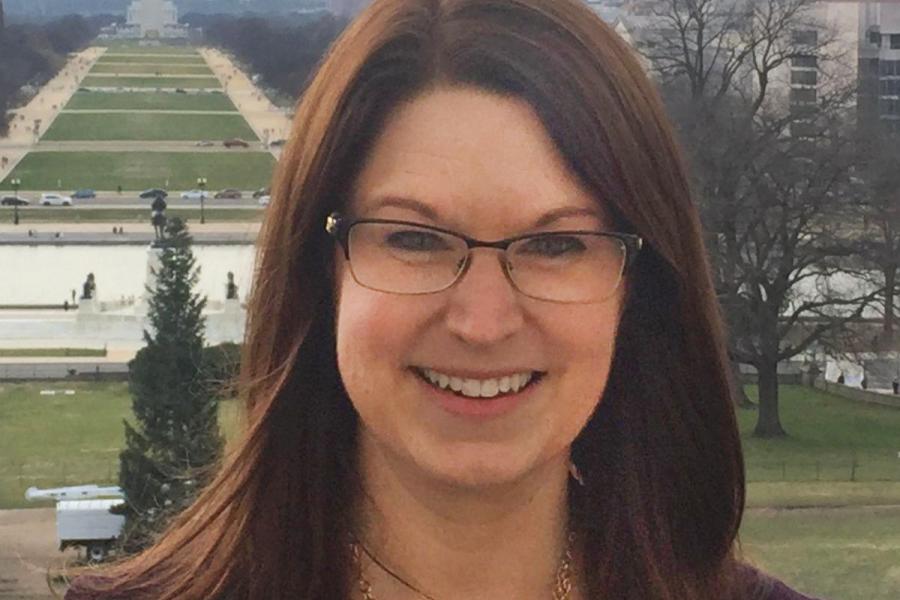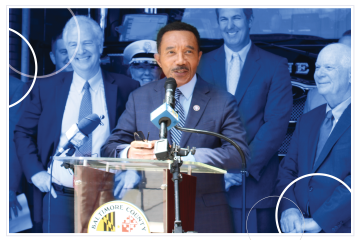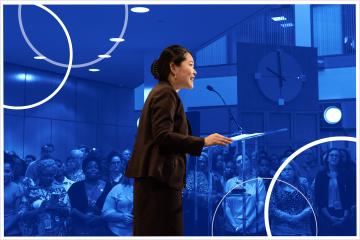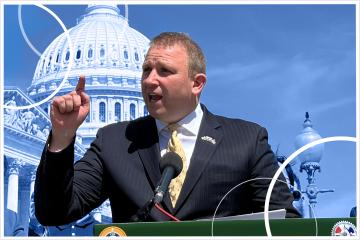The Johns Hopkins Changemakers Profile is a monthly feature spotlighting the impact of Johns Hopkins alumni in positions of influence in Washington, D.C., policymaking circles.
Rachel Stevenson is not a nurse by profession. But she is inspired by the selfless and tireless work of nurses as she works on Capitol Hill as a fierce advocate for the federal support nursing schools require to maintain a robust pipeline of nurses sorely needed to treat an ailing, aging America.
Stevenson earned a master's degree in global security studies from Johns Hopkins University in 2012 and now works as director of government affairs for the American Association of Colleges of Nursing (AACN). She also serves as executive director of the Nursing Community Coalition, which is made up of 63 associations representing various elements of the nursing profession—education, research, regulation, and practice.
Stevenson, 40, champions nursing education to Congress whenever lawmakers debate the federal funding needed to adequately staff the United States with nurses, especially in the nation's most remote corners.
Her lobbying work over the past five years at AACN has corresponded with increasing levels of federal funding for educating nurses, whose dwindling ranks need to be replenished to keep up with the surging national demand for their care. Congress and President Biden recently approved $300 million for Nursing Workforce Development Programs, which support the recruitment, education, and retention of nursing students, faculty, and practitioners to maintain an adequately sized workforce for a nation growing older and sicker. The money also supports scholarships and helps to repay school loans.
"We work with congressional champions to support our current and future nurses," Stevenson said. "It's wonderful to be a small part of that."
Occupation: Director of Government Affairs, American Association of Colleges of Nursing
Age: 40
Hometown: Marquette, Michigan
Education: Johns Hopkins University, MA in Global Security Studies, 2012; American University, BA in Political Science, and Interdisciplinary Studies: Communication, Legal Institutions, Economics and Government, 2006.
Johns Hopkins School of Nursing Dean Sarah L. Szanton praised the AACN for its advocacy.
"As nurses, we recognize the profound impact we make, one individual, family, and community at a time," Szanton said. "But as advocates, our reach extends even further. That's why it's so important that the American Association of Colleges of Nursing champion policies that empower nurses—so that we may amplify the voices of those we serve in the policies that shape our lives."
Stevenson said her passion for politics and policy was first sparked by a government class at Central Michigan University more than 20 years ago—at a time when the controversy of the 2000 presidential election and the terrorist attacks of Sept. 11, 2001, thrust national and international affairs to the forefront of students' lives.
Her parents remember a slightly different origin story.
"They said I ran for student government in middle school and asked if I didn't remember being totally enamored with a trip we took to see [Vice President] Al Gore when he visited the Upper Peninsula," Stevenson said. "In my mind, my interest in politics started in college. But, according to my family, it was there all along."
Regardless of how her passion started, Stevenson has been so steeped in policy and politics that she can say she literally and figuratively lives on Capitol Hill—the name of a D.C. neighborhood and the seat of Congress.
Once the political hunger took hold, Stevenson transferred to American University to feast on a campus and curriculum immersed in politics and government. She majored in political science and an interdisciplinary studies program focused on communications, legal institutions, economics, and government. After completing her bachelor's degree in 2006, she headed off to Iowa to work as a political field organizer.
"Being on the ground for campaigns in Iowa solidified my passion for politics," she said.
But, she added, the conversations with Iowa residents' concerns led her "to the other side of that coin: policy and government affairs."
A fellow organizer alerted Stevenson to a scheduling position in the D.C. office of her hometown's congressmen: Rep. Bart Stupak, from Michigan's 1st Congressional District.
"I was very lucky to get that job," she said. "He looked at this young 20-something and saw some potential in me that I didn't even know I had."
Scheduling a busy congressman's affairs during Affordable Care Act debates gave Stevenson a daily education on how The Hill works. When Stupak announced he would not seek reelection in 2010, Stevenson landed a position lobbying for health care, education, and Indian Affairs clients at Wheat Government Relations, a firm started in 1997 by former Congressman Alan Wheat of Missouri.
Three years later, she followed Wheat to Polsinelli, the national law firm that had hired the former Missouri congressman as its public policy chair. At Polsinelli, Stevenson worked as a legislative director.
"[Wheat Government Relations] took my knowledge of The Hill and helped me realize I could work on policy as well," she said. "They supported me as I was getting my master's degree at Johns Hopkins at night."
She said her Johns Hopkins education gave her "transferrable skills to think innovatively and to really look at solutions from a 3D perspective."
Her master's work taught her to examine all possible outcomes and potential scenarios to various issues before developing the best strategy to be successful. "Johns Hopkins gave me the lessons I needed to be successful," she said.
In an interview, Wheat said Stevenson demonstrated an ability to tackle almost any policy issue by methodically breaking each down to their components to best comprehend the most important elements, communicate about them clearly, and generate enthusiasm among her colleagues to advocate for and produce the best results for clients.
"At one point she didn't know anything about nursing; now she's the head of the Nursing Community Coalition," said Wheat, now chairman of Wheat Shroyer Government Relations. "She has made herself into a top policy expert. She's also able to get people motivated and committed to whatever issues she is working on."
After working as legislative director at Polsinelli for nearly five years, Stevenson took the government affairs job in 2018 for the American Association of Colleges of Nursing. Four years later she was nominated for an award for excellence in federal advocacy from Women in Government Relations.
Today, Stevenson is carrying out the vision she had for her career nearly two decades ago in Iowa.
"My time in Iowa fueled my passion for working with people on important issues, especially at the federal level, and figuring out how they are impacted by government decisions," she said. "I am privileged to be able to do this work on behalf of nursing schools, faculty, students, and nurses who are the fearless face and the unbreakable backbone of the nation's health care system."
Posted in Politics+Society
Tagged nursing












